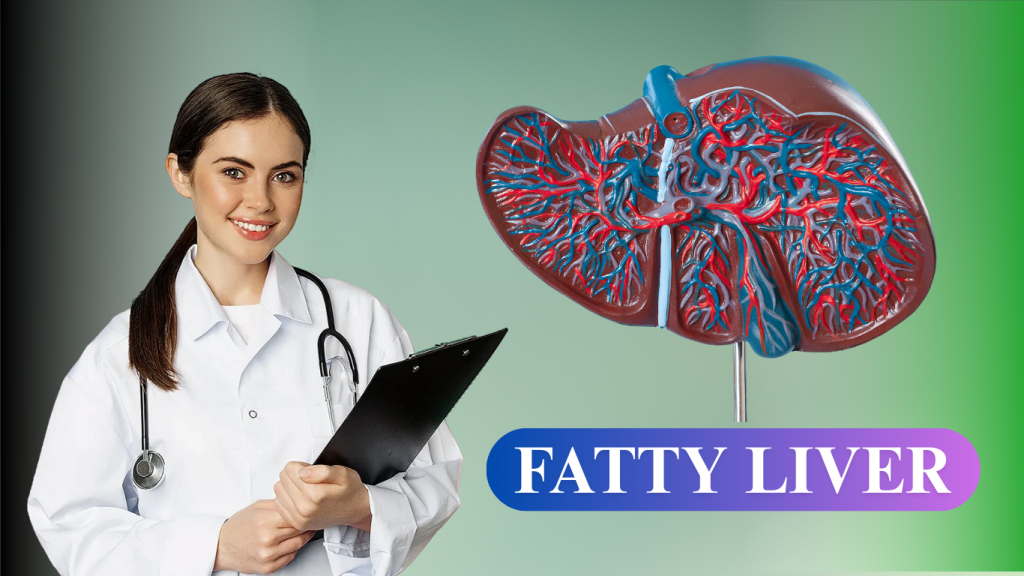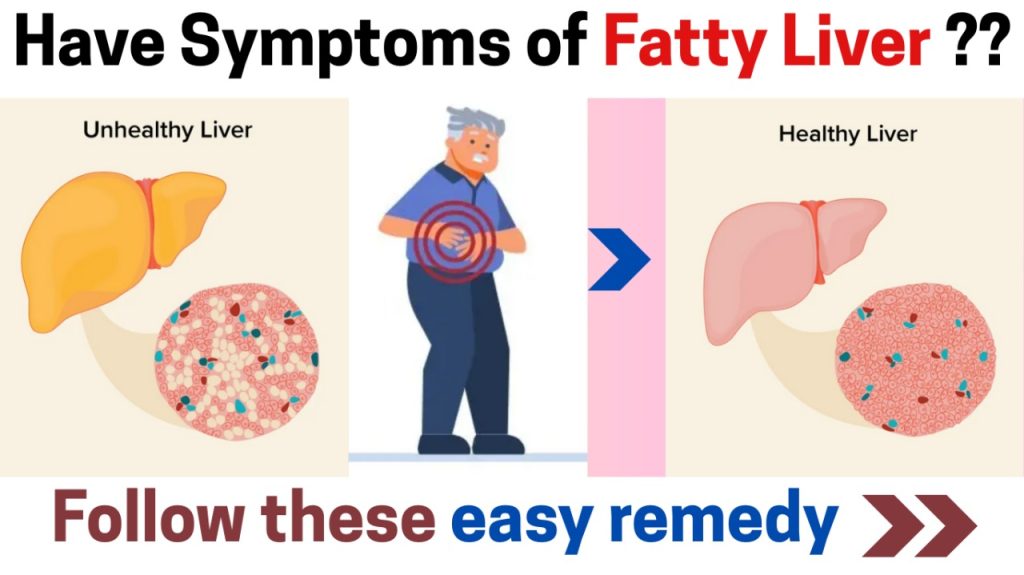Today through this article we will know why fatty liver and its symptoms, causes, and natural treatments.
In this article, we will learn about these main topics.
👉 Introduction
👉 What is Liver?
👉 How Does the Liver Work?
👉 What is Fatty Liver?
👉 Symptoms of Fatty Liver
👉 Causes of Fatty Liver
👉 Ayurvedic Treatment for Fatty Liver
👉 Home Remedies for Fatty Liver
👉 Precautions
👉 Conclusion

1. Introductions
In today’s fast paced life, polluted environment, bad eating habits, lack of time and stress are some of the factors that have greatly affected our lives. All these factors have a very bad effect on our liver, leading to problems like fatty liver and its symptoms. And sometimes our lives are at risk. Because of all this our liver gets damaged. Today we will learn in detail how we can avoid these issues related to fatty liver and what the remedies are.
2. What is Liver?
Fatty liver is a serious disease. In today’s busy life, this disease is spreading very fast due to unhealthy lifestyle, wrong eating habits and lack of exercise. In this condition, excess fat gets accumulated in the liver which can further cause serious problems like liver failure, psoriasis, and inflammation. Today we will get complete information about its causes, precautions, Ayurvedic treatment, diet, and how to manage fatty liver effectively.
The liver is one of the most essential organs in our body. Located in the upper right side of the abdomen, the liver is responsible for more than 500 vital functions. Without a healthy liver, your body cannot digest food, store energy, or remove toxins.
Some of the key roles of the liver include..
Anatomy of the Liver
- Structure :- It is divided into two parts and made of spongy tissue.
- Weight :- 1.4–1.6 kg (about 3 pounds) in adults.
- Blood Supply :- Blood Supply:- Blood supply receives blood from its hepatic artery and portal vein.
Key Functions of the Liver
Metabolism :- It breaks down fats, proteins, and carbohydrates for energy in our bodies. It also regulates blood sugar by storing excess glucose as glycogen.
Detoxification :- It filters out toxins from drugs, alcohol, environmental pollutants. Converts ammonia into urea for excretion.
Storage :- Stores iron, copper, and vitamins for future use.
Immune Support :- Produces immune factors to fight infections.
The liver is also involved in hormone regulation and immune system function, making it an essential organ for overall health and well-being.
3. How Does the Liver Work?
The liver receives nutrient-rich blood from the digestive system through the portal vein and oxygenated blood from the heart through the hepatic artery. It processes this blood and performs the following functions. Which are as follows.
The liver operates like a chemical processing plant. Here’s a step-by-step breakdown.
Blood Filtration Process :-
⏺ Blood from the digestive system enters the liver via the portal vein, carrying nutrients and toxins.
⏺ Liver cells (hepatocytes) filter toxins and metabolize nutrients.
⏺ Clean blood is sent back to the heart, while waste is excreted via bile or kidneys.
Fat Digestion and Bile :-
⏺ Bile (produced by the liver) is stored in the gallbladder.
⏺ When you eat fatty foods, bile is released into the intestines to break down fats.
Liver Regeneration :-
The liver is the only organ that can regenerate itself. Even if 75% is damaged, it can regrow to full size!
It also stores important vitamins and minerals like iron, copper, and vitamin A. When the liver functions properly, it helps keep our metabolism and immune system balanced.
4. What is Fatty Liver?
Fatty liver, or hepatic steatosis, is a condition in which excess fat builds up in the liver cells. Normally, the liver contains some fat, but when the fat content exceeds 8% to 10% of the liver’s weight, it is classified as fatty liver disease. Excess fat inflames the liver, leading to scarring (cirrhosis) or liver failure if untreated.
Fatty liver can be categorized into two main types
Non-Alcoholic Fatty Liver Disease (NAFLD) :- Occurs in people who consume little or no alcohol. It is often linked to obesity, type 2 diabetes, insulin resistance, and high cholesterol levels. Affects 25% of adults globally, often tied to obesity or diabetes.
Alcoholic Fatty Liver Disease (AFLD) :- Caused by heavy alcohol consumption. The liver cannot process alcohol effectively, which leads to fat accumulation.
What is at Risk Heavy drinkers or those with poor diets. People with obesity, type 2 diabetes, or metabolic syndrome.
5. Symptoms of Fatty Liver
Fatty liver often has no symptoms in the early stages. It is usually detected during routine checkups. However, as fat builds up and inflammation increases, the following symptoms may appear. Fatty liver develops when the liver can’t efficiently break down fats. Key causes include.

Advanced Symptoms :-
✔ Jaundice :- Yellowing of the skin and eyes, indicating liver dysfunction.
✔ Unintended weight loss :- Losing weight without trying.
✔ Edema :- Swelling in the legs, feet, or abdomen.
✔ Loss of appetite :- Reduced interest in food.
✔ Confusion or brain fog :- Difficulty concentrating or remembering things, a sign of hepatic encephalopathy.
Early Symptoms :-
✔ Weakness and general sluggishness.
✔ Feeling full or bloated even after eatin.g small meals
✔ Advanced Symptoms.
✔ Feeling tired or fatigued most of the time.
✔ Mild discomfort or pain in the upper right side of the abdomen.
When to See a Doctor
NOTE :- You should consult a doctor if you notice any of the above symptoms, especially if you have risk factors like obesity, diabetes, or high cholesterol. Early detection and lifestyle changes can prevent complications.
6. Causes of Fatty Liver
Fatty liver develops when the liver can’t efficiently break down fats. Key causes include. Fatty liver can result from various causes, and understanding them helps in prevention and treatment
Common Causes :-
⏺ Type 2 Diabetes and Insulin Resistance :- Causes fat accumulation in liver tissues
⏺ Excessive Alcohol Consumption :- Damages liver cells and leads to AFLD
⏺ Poor Nutrition :- High intake of sugar, refined carbs, and processed foods
⏺ Obesity :- Excess fat in the body increases the fat in liver cells
⏺ Rapid Weight Loss :- Can cause stress on the liver and trigger fat accumulation
⏺ Genetics :- Family history of liver disease may increase risk
⏺ Polycystic Ovary Syndrome (PCOS) :- and other hormonal disorders
⏺ High Blood Cholesterol and Triglycerides :- Promote fat storage in the liver
Medical Conditions :-
✔ Hormonal Disorders :- Hypothyroidism or polycystic ovary syndrome (PCOS).
✔ Rapid Weight Loss :- Starvation diets overwhelm the liver’s fat-processing capacity.
✔ Insulin Resistance/Type 2 Diabetes :- High insulin levels promote fat storage.
✔ High Cholesterol/Triglycerides :- Excess fats circulate in the blood, depositing in the liver.
7. Ayurvedic Treatment for Fatty Liver
Ayurveda offers natural, holistic treatments that aim to detoxify the liver and restore balance to the body. The focus is on improving digestion (Agni), detoxifying Ama (toxins), and balancing doshas. Ayurveda views fatty liver as a Pitta-Kapha imbalance (excess heat and mucus). Treatments focus on detoxification (Panchakarma) and herbal remedies.
Ayurvedic Herbs for Fatty Liver
⏺ Kutki (Picrorhiza kurroa) has strong hepatoprotective and anti-inflammatory properties. It stimulates bile production and helps cleanse the liver.
⏺ Bhumyamalaki (Phyllanthus niruri) This herb helps repair liver cells, reduces fat accumulation, and supports liver detox.
⏺ Kalmegh (Andrographis paniculata) Known as “king of bitters,” Kalmegh purifies the blood and helps regenerate liver tissues.
⏺ Triphala A blend of three fruits—Amalaki, Haritaki, and Bibhitaki—that improve digestion, cleanse the liver, and act as antioxidants.
Ayurvedic Detox Practices
⏺ Abhyanga :- Daily self-massage with warm sesame oil to improve circulation.
⏺ Panchakarma Therapy :-A detox procedure to eliminate toxins from the body using techniques like Virechana (purgation) and Basti (medicated enemas)
⏺ Dietary Changes :- Eating sattvic food that is fresh, light, and nourishing.
⏺ Yoga Asanas :- Poses like Ardha Matsyendrasana, Dhanurasana, and Bhujangasana to improve liver function.
⏺ Meditation and Pranayama :- Reduce stress and improve energy balance.
Ayurvedic Herbs for Weight Loss and Home remedies……Read More
Home Remedies for Fatty Liver
Simple lifestyle changes can reverse early-stage fatty liver
Lemon Water :- Detoxifies the liver and aids digestion. Drink warm lemon water with honey in the morning.
Green Tea :- Rich in catechins, green tea reduces liver fat and protects against liver inflammation.
Apple Cider Vinegar :- Promotes fat metabolism and weight loss. Mix 1 tablespoon in warm water and consume twice a day.
Turmeric Milk :-Turmeric contains curcumin, a powerful antioxidant that repairs liver cells. Drink before bedtime.
Flaxseeds :- Contain lignans and omega-3s that support liver function. Add ground flaxseed to smoothies or oatmeal.
Papaya Seeds :- Crushed papaya seeds mixed with lemon juice may support liver detox.
Garlic :- Activates liver enzymes and helps in fat metabolism. Chew raw garlic cloves or add to food.
Aloe Vera Juice :- Reduces liver inflammation and aids digestion. Take 1 tablespoon daily.
8. Precautions
Do: – Eat fiber-rich foods (oats, broccoli, apples). Choose healthy fats (avocado, nuts, olive oil).
Don’t :- Consume trans fats (packaged snacks, margarine). Overeat in one sitting; opt for smaller, frequent meals.
9. Conclusion
Fatty liver is reversible with early diagnosis and consistent effort. Combine Ayurvedic herbs, a whole-food diet, and regular exercise to restore liver health. Always consult a doctor before starting new treatments, especially if you have existing conditions like diabetes.
Spacial Note
Please read the note. The information given in this article has been taken from Ayurvedic books and Senior Ayurvedic doctors. These articles only show information for health and the way to stay healthy. And before taking any Ayurvedic remedies and medicines, consult an Ayurvedic doctor once, only after that take any medicine or treatment.